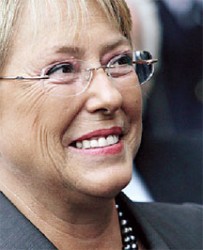SANTIAGO (Reuters) – Chile’s weakened conservative UDI party said on Saturday it has picked Labor Minister Evelyn Matthei as its new candidate in the November presidential election, which is expected to see former President Michelle Bachelet triumph.

Matthei steps in after the right-wing’s former candidate Pablo Longueira, unexpectedly quit the campaign on Wednesday due to depression, sending the bloc into disarray.
Longueira had launched his campaign after the right’s previous favorite Laurence Golborne, dropped his bid in April because of a scandal from his time as chief executive officer of retailer Cencosud.
“These are difficult times,” Patricio Melero, the UDI’s president, said during a news conference, adding “we think Matthei is a winning candidate.”
An economist known for her blunt style, Matthei is a seasoned member of the Union Democrata Independiente (UDI) party.
Conservative Chile has never had two women presidential front-runners.
Bachelet, who was Chile’s first female president, is expected to easily beat Matthei in the Nov. 17 general election or a potential Dec. 15 runoff.
Her approval ratings hover near 75 per cent, compared with around 34 per cent for Matthei, according to a survey conducted by pollster CEP between November and December, which was the most recent such poll.
Paediatrician-turned-politician Bachelet has promised to tackle Chile’s steep economic inequality by raising corporate taxes to work towards funding free university-level education. She also wants to legalize abortion in some cases and reform the dictatorship-era constitution.
While Matthei’s programme hasn’t been unveiled yet, she has broadly backed conservative President Sebastian Pinera’s economic policies, and said she is against free university-level education and in favour of legalizing abortion in certain cases.
Bachelet and Matthei reportedly have known each other since childhood, as both their fathers were air force generals.
But Bachelet’s father was loyal to socialist President Salvador Allende, who was removed in a 1973 military coup that ushered in the brutal, 17-year Augusto Pinochet dictatorship. He was subsequently arrested and tortured by Pinochet’s agents and died in prison months later.
Matthei’s father, however, was a member of the junta.
The centre-right Renovacion Nacional (RN) party has not officially announced whether it will rally behind Matthei or send its own candidate into the general election, which could further split the right-wing Alianza coalition.
But the RN’s former candidate, Andres Allamand, who narrowly lost to Longueira in the June 30 primaries, has indicated he would only revive his campaign if he were the bloc’s sole runner.
While Bachelet is expected to easily trounce rivals, analysts say the right could suffer an even sharper presidential defeat if it fails to settle on one candidate.
Conservative candidates are dogged by the legacy of Pinera, a gaffe-prone billionaire who has struggled to connect with ordinary Chileans despite strong economic growth. He is barred from running for a second consecutive term.
Bachelet’s affable style and social policies have made her popular in mining powerhouse Chile, where many feel they have not seen the fruits of a copper boom.





